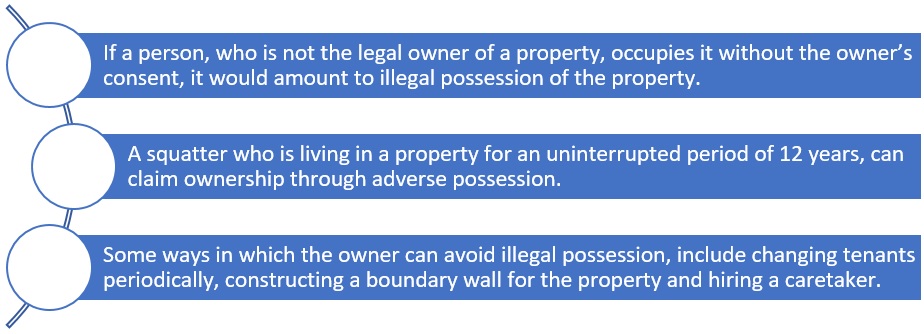Among the many cases that pertain to land in India, a large number are related to illegal property possession. Owing to the sheer worth of property, these often become subject to unlawful occupation by unscrupulous persons if left unoccupied or unattended. Such entities also resort to forging of legal documents to prove their wrongful ownership over a property. Between flats and plots, the latter are more vulnerable to unlawful possession as it allows wider scope for illegal occupation.

What is illegal property possession?
If a person, who is not the legal owner of a property, occupies it without the owner’s consent, it would amount to illegal possession of the property. As long as the occupant has the owner’s permission to use the premises, the arrangement would have a legal validity. That is why properties are offered on rents to tenants under lease and licence agreements, under which the landlord provides the tenant with limited rights to use his property for a specific time period. Inhabiting the premises after this timeframe, would amount to illegal possession of property by the tenant.
See also: Police verification for rent agreement: is it must?
What is adverse possession?
If the tenant continues to occupy the property for a period exceeding 12 years, even the law will enable him to continue with the possession of the property. This is known as adverse possession in legal parlance. In case an owner does not stake his claim over his property for 12 years, a squatter can acquire legal rights over the property. Provisions on adverse possession are made under the Limitation Act, 1963.
A recent ruling by the Punjab & Haryana High Court also says that state can acquire land using adverse possession, adding that such cases were required to be treated as rare and exceptional.
In a more recent order, the Supreme Court has clarified that the merely a long period of possession does not translate into the right of adverse possession.
How to deal with illegal possession?
Property owners have to deal not only with outside entities but also keep an eye on their tenants to ensure that their property does not fall prey to any fraudulent activity. Here are some precautionary measures to avoid this:
Thoroughly screen tenants
If media reports are any indication, a large number of property owners land into trouble due to unscrupulous tenants. A lot of times, the origin of this problem can be traced to the landlord’s failure to screen the tenant property. Not making due efforts to run the regular checks about the identity and the occupation of the tenant can cause a great of problem in future. Earning rent is the easy part of property ownership; maintaining that ownership could prove to be a challenging task. Keeping that as your mantra, run all the necessary checks. There should not be any cutting of corners in that aspect in the name of politeness.
Keep an eye on your rented property
This year, the media gave wide coverage to instances, where elderly landlords in Noida were forced to perform a sit-down front of their homes bag and baggage as a sign of protest, since tenants refused to vacate their properties. There is useful lesson for all landlords out there in that agony felt by the elderly couple. Tenant verification is not optional and the tenancy must be protected through registration of the rent agreement.
Even if you have found a fairly sensible tenant who has been regular with monthly rent payments and the upkeep of the dwelling, there is no reason to get complacent. Keep a close watch on your property and make your presence felt by making regular visits, without causing any disturbance to the tenant. In case the property is outside your city or country and making regular visits is not an option, hire someone or make someone in-charge, to perform your duties. You can never be too careful with property.
See also: All about prohibited property
Make frequent visits
This goes without saying — unattended property of any kind, especially those situated at prime locations, would attract the attention of land mafia and criminals. While making proper arrangements for the physical safety of the property is of extreme importance (getting a boundary wall constructed, for example), making regular visits is equally necessary. Unless you have hired a trusted caretaker, regular personal visits are recommended.
Save some space for personal use in rental property
Another trick to keep an eye on your rented property is to save may be one room in the property for your personal use, even if you don’t plan to stay here. You can make a visit to the property and get a clear sense of how whether all is alright with the property and the tenant. You can also use the area along the property to develop a garden. This way, you can kill two birds with one stone. First you will increase the value of your property by creating a green space around it. Second: you will have a valid reason to visit your rental property every day. In this process, you can also upskill yourself and turn into a green-fingered genius.
However, be advised that you should not be interfering with the privacy of your tenant in any manner of form. Keeping an eye on your property is one thing and harassing your tenants is another. Rent laws in India prescribe penalties against breach of privacy if the landlord is found guilty of such as act.
Keep changing tenants
In view of the aforementioned legal limitation, it becomes important for a landlord to change their tenants from time to time. This is also why most landlords provide their homes for rent only for 11 months, and, subsequently, renew the rent agreement in case they are comfortable with prolonging the stay of their existing tenant.
See also: All about rent agreements
Get a boundary wall constructed
Construction of a boundary wall is the first thing one has to do, in case of plots and land parcels. This has to be done, irrespective of whether the owner lives close to the location or not. Ideally, a housing unit must also be constructed to minimise the scope of interference from land sharks. Those living far from the location must put somebody in charge, to regularly visit the property, to ensure it remains free from illegal activities. While it may not always be a viable option, hiring a caretaker would also be a good way to avoid illegal occupation. This is especially true, in case of non-resident Indian (NRI) plot owners.
Mount a warning signboard
Apart from the fencing, you must also guard your private property with a no-trespassing signboard. The signboard must clearly mention that this is a private property belonging to you and that action will be taken against trespassers.
Insist on rent agreement registration
To save cost and avoid procedural hassles, landlords often go for 11-month rent agreements that don’t require registration. According to legal experts, this short-cut may prove to be quite problematic in the face of an adverse event. An unregistered rent agreement is not a documental proof, as far as the law is concerned. In your best interest, keep it legal, and get the rent agreement registered.
Legal action against illegal possession of property
Those who have been at the receiving end of an illegal activity, can seek relief under various provisions of the Indian law.
First, you should file a written complaint with the city’s superintendent of police (SP), where the property is located. In case the SP fails to acknowledge the complaint, a personal complaint in the court concerned can be filed.
You could also file a police complaint about the same. Keep a copy of the FIR safe for future references. The authorities will be obliged to take action under Section 145 of the Code of Criminal Procedure (CRPC).
You could seek relief under Sections 5 and 6 of the Specific Relief Act, under which a person dispossessed of his property may recover his right, by proving previous possession and subsequent illegal dispossession.
Various sections of IPC applicable in such situations
Section 441
This section defines criminal trespass.
What is criminal trespass?
“Whoever enters into or upon property in the possession of another with intent to commit an offence or to intimidate, insult or annoy any person in possession of such property, or having lawfully entered into or upon such property, unlawfully remains there with intent thereby to intimidate, insult or annoy any such person, or with intent to commit an offence, is said to commit ‘criminal trespass’.”
Section 425
This section deals with mischief.
What is mischief?
“Whoever with intent to cause, or knowing that he is likely to cause, wrongful loss or damage to the public or to any person, causes the destruction of any property, or any such change in any property or in the situation thereof destroys or diminishes its value or utility, or affects it injuriously, commits ‘mischief’.”
Section 420
This section deals with cheating and dishonestly inducing delivery of property.
What is cheating and dishonestly inducing delivery of property?
“Whoever cheats and thereby dishonestly induces the person deceived to deliver any property to any person, or to make, alter or destroy the whole or any part of a valuable security, or anything which is signed or sealed, and which is capable of being converted into a valuable security, shall be punished with imprisonment of either description for a term which may extend to seven years, and shall also be liable to fine.”
Section 442
This section deals with house trespass.
What is house trespass?
“Whoever commits criminal trespass by entering into or remaining in any building, tent or vessel used as a human dwelling or any building used as a place for worship, or as a place for the custody of property, is said to commit ‘house-trespass’.”
Section 503
This section deals with criminal intimidation.
What is criminal intimidation?
“Whoever threatens another with any injury to his person, reputation or property, or to the person or reputation of any one in whom that person is interested, with intent to cause alarm to that person, or to cause that person to do any act which he is not legally bound to do, or to omit to do any act which that person is legally entitled to do, as the means of avoiding the execution of such threat, commits criminal intimidation.”
State-centric remedies
Various states have put in place separate remedial agencies, to deal with cases of land grabbing and property frauds. In Uttar Pradesh, for example, you can approach the Anti-Land Mafia Task Force. You have the option to register your complaint at jansunwai.up.nic.in/ABMP.html.
Important court orders
Person claiming adverse possession must know the actual owner: Supreme Court
March 18, 2024: A person claiming adverse possession of a property must know its actual owner, the Supreme Court has ruled. While delivering its order in the M Radheshyamlal versus V Sandhya and Anr. Etc case, a two-Judge Bench of Justice Abhay S Oka and Justice Ujjal Bhuyan also stated that to prove an adverse possession, a person must establish when they came into possession, and plead and prove that they were claiming possession adverse to the true owner, that their long and continuous possession was known to the true owner and that their possession was open and undisturbed.
The apex court was deliberating on a series of appeals stemming from three distinct lawsuits concerning a property dispute.
“It is a settled law that by pleading adverse possession, a party seeks to defeat the rights of the true owner, and therefore, there is no equity in his favour. After all, the plea is based on continuous wrongful possession for a period of more than 12 years. Therefore, the facts constituting the ingredients of adverse possession must be pleaded and proved by the plaintiff,” the top court said in its order dated March 18, 2024.
Husband buying property in wife’s name not always benami transaction: HC
June 9, 2023: A husband supplying the money to her wife for property purchase does not necessarily make the transaction a benami one, the Calcutta High Court (HC) has ruled. For the transaction to qualify as benami transaction, the intention of the husband behind providing this monetary support is crucial, the HC said in an order dated June 7, 2023
Read full coverage here.
Photocopy of sale deed can’t be accepted as surety: Allahabad HC
June 5, 2023: The photocopy of a sale deed is not admissible as surety under Section 17 of the Provincial Small Causes Court Act, 1887, the Allahabad High Court has ruled. Section 17 of the Act provides that security may be realised in manner provided in Section 145 of the Code of civil Procedure (CPC). Section 145 of the CPC deals with enforcement of liability of surety.
Read full coverage here.
FAQs
Who can claim adverse possession?
A person who is not the original owner, can claim adverse possession of a property, if he has been in possession of the property for a minimum of 12 years, during which the owner takes no legal effort to evict him.
What is possession in property?
Possession refers to the act of gaining or exercising physical control or custody of the property.
What is the transfer of possession?
A transfer of possession refers to a change or lapse in the possession of an asset.

An alumna of the Indian Institute of Mass Communication, Dhenkanal, Sunita Mishra brings over 16 years of expertise to the fields of legal matters, financial insights, and property market trends. Recognised for her ability to elucidate complex topics, her articles serve as a go-to resource for home buyers navigating intricate subjects. Through her extensive career, she has been associated with esteemed organisations like the Financial Express, Hindustan Times, Network18, All India Radio, and Business Standard.
In addition to her professional accomplishments, Sunita holds an MA degree in Sanskrit, with a specialisation in Indian Philosophy, from Delhi University. Outside of her work schedule, she likes to unwind by practising Yoga, and pursues her passion for travel.
[email protected]











